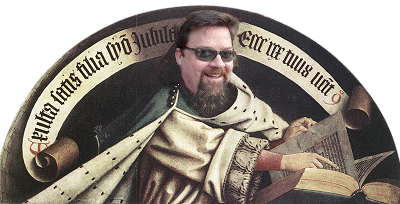by Dan Phillips
Have you ever heard a eulogy about someone you barely knew and thought "Dang! He sounds like he was a pretty great guy. Too bad it's too late!" I have; and I've often thought it might be more serviceable to deliver eulogies
before our beloveds get their "promotion," so to speak.
So, since
Phil's reached a significant turning-point, and though (if God says "yes" to my prayers) he'll still be "the
troubler of Israel" for many fruitful
decades to come, I thought I'd offer a bit of an encomium. And since Frank's already raised his glass in an
incredibly witty, pitch-perfect toast, the more sonorous essay falls to me.
I've heard that it's a saying in government work that if you stick your finger into a glass of water and then pull it out, and leave a hole, then you're irreplaceable.
Phil Johnson is leaving a hole in the watery world of Christianoid blogdom.
Phil started blogging in 2005, his
first post bearing a Latin title, explaining the name "Pyromaniac" (trivia: the blog was almost named
PurpleHaze), and laying the ground rules. From there, Phil made his mark with his unique and inimical style. What is that style? It's a rare combination of wit, eloquence, substance, clarity, maturity, sagacity, wisdom and passionate intensity. Maybe it's simpler to say that Phil Johnson writes like a
man. A
Christian man. Sadly, that alone is enough to make him stand out in Christian blogdom today.

I began reading in 2005, made Phil's Blogspotting feature and entered the comment meta as a distant blip of a fanboy. What captured me about Phil's writing was his way of slicing right through to the heart of things in such a deft yet common-sense way that it left you feeling both stupid and smarter at the same time.
Stupid, as in "Oh, duh, why didn't
I see that?";
smarter, as in "All right, I totally get that now."
I've often told the story about how I got The Email That — to use a florid but accurate phrase — Changed My Life. It popped up in my Inbox on January 19, 2006. Ironically, I had actually emailed Phil (not sure whether he knew me from Adam, or Jay Adams, for that matter) about the fact that I didn't feel like I was getting anywhere in my blogging. I had a couple of hundred visitors a day, I think, and just wasn't penetrating, wasn't getting anywhere, wasn't making a dent.
Phil responded graciously and, at the end, said this:
Meanwhile, because of the drain on my time and creative energies, I'm planning to convert "Pyromaniac" to a group blog, and you're one of the first I thought of as a possible team member. Are you interested?
I was stunned. My first thought was that he'd written the wrong "Daniel." Phil had confused me for another Daniel, probably the Canadian Daniel. I was actually afraid to answer. Can you understand that? The bubble would pop in due course, so let's enjoy the illusion while we can.
In fact, Phil had to write the next day:
Dear Dan,
Did you get the e-mail invite from blogger to join the new blog team? I sent it last night.
Pretty sad, eh? The "Dan" encouraged me that Phil knew who he was writing. I fell over myself accepting, and on the 23rd I received an email with rules for writing for the blog. I still hadn't met the man.
That would happen in June of 2007, when I flew out to meet Phil for the Founders Conference in Oklahoma, where Phil was saved and grew up. Frank also came, so we three were together for the first time. Phil was just as he is in print: gracious, funny, sharp, smart, pretty much a fountain of information. I had a terrific time. Phil's parents were a sheer joy to meet and begin to know. They were fun to visit with, and they fed Frank and me like sultans. It wasn't hard to see where Phil learned to be so generous and gracious.

Phil gave me a tour around town, showing me the window to the very room in which he trusted Christ as his savior and Lord. We also encountered my first Bass Pro shop,
Elmer's, the Oral Roberts complex, the GUTS church, and the awe and mystery of my first (but not last!) Sonic.

My life had already been changed, thanks to Phil. Blogging at this level in itself was a new, heady and fun experience. Because of it, I had been invited to
speak at a conference in Arizona later that year. But at the Founders Conference itself I heard David Wells speak, and an
almost offhand remark he made sparked a cascade of fireworks in my mind which eventually issued in my
first book.
In fact (since this post is in danger of turning into a novella) let me just trace that theme. The
best parts of my life are knowing God in Christ, and my loving family. Apart from that, so much of what I have enjoyed most in the past six years has been related directly or indirectly to Phil Johnson:
- The Johnson, Turk and Phillips families becoming friends
- Opportunity to open the Word for an international audience through blogging
- Cyber-friends all over the world
- Opportunity to do conferences in Arizona, Tennessee, and England (so far)
- The World-Tilting Gospel, endorsed by Phil and, thanks to him, by John MacArthur
- God's Wisdom in Proverbs, also endorsed by Phil
- My current pastorate in Houston, Texas
- Sonic!
- Cracker Barrel!
Okay, those last two are well down the list.
Regardless, while God can do whatever He wants with or without means, He used Phil to bring an amazing flood of good into my life, and my family's life. This is a debt I can never repay.
 And I'm sure I'm one of hundreds, or more likely thousands all over the globe, who could say that to some degree. Other big names you know are very self-absorbed, ungracious, grimly dedicated to building their kingdoms and making names for themselves. They're happy to hear the Clubhouse door slam shut behind them on their way to their easy chair. Not Phil. He is an incredibly giving, caring man. First time he was in my neck of the woods was when he flew up to encourage a disheartened friend. That's Phil.
And I'm sure I'm one of hundreds, or more likely thousands all over the globe, who could say that to some degree. Other big names you know are very self-absorbed, ungracious, grimly dedicated to building their kingdoms and making names for themselves. They're happy to hear the Clubhouse door slam shut behind them on their way to their easy chair. Not Phil. He is an incredibly giving, caring man. First time he was in my neck of the woods was when he flew up to encourage a disheartened friend. That's Phil.
So let's get back to the singularity that is Phil as a blogger. There simply is no one blogging who does what he has done,
let alone do it as well as he. I am not saying there aren't great and valuable bloggers. But there simply isn't anyone who combines Phil's sharp wit, his humor, his robust jocularity, his directness, his clarity, his steady ability to keep first things first, and his ability to cut directly to the heart of the matter memorably and forcefully.
Elitist blogs pretend not to see him, but they do, and we all know it. The errant and erring pretend not to know who he is, but they do, and we all know it. We all laughed at Frank's absolutely hysterical video — but, you know, I laughed and winced at the start. Things will happen, those who should know better will say idiotic and harmful things, and those who should speak up will remain silent.
And you know what I'll be thinking?
"I really, really want to read what Phil thinks about that."

Now Frank Turk, in addition to being a menace whom to stop is imperative, writes like a force of nature. Watching Turk do what he does is like watching Niagara Falls fall. He is amazing, he's unique, he's Phil's big "find," and I hope he does what he does forever. God willing, I will continue to do what I can.
But I'm sure Frank would agree with me: there's just the one Phil. He was needed. He's still needed. He'll be missed in blogdom, and I pray someone with his stature will begin doing what he did as well as he did it, or that we who do will bring up our game accordingly. We'll see.
I take solace in looking to Phil to put out books in his own name and voice. Frankly, I hope MacArthur tells him "I've written enough for now. You take a year off and
you write something."
When he does, I'll be there, I'll read it. Even if it's mostly about schmerodactyls, meat chubs, or the TSA.
And you will, too.
Coda (to use a Phil-like word)
Readers may be wondering, "But, you're still friends, right?" Oh thank God, yes. I'll still plague the poor soul with emails and phone calls, and see him whenever I can, until the doctor tells him "Actually, I was mainly talking about Phillips." That's all good for
me.
My genuine point is that I care about the Christian blogosphere, I'm concerned about it, I'm actually pretty torn-up about it in some regards — and if I had to pick 25000 names I'd like to see stop blogging altogether (if I even knew that many)
[Note from Frank: I'll make the list ...] Phil Johnson wouldn't be on that list.
I'd be on that list before Phil's name.
Other readers probably think, "You know, seven years later, you're still a fanboy." Guilty. The privilege of getting to be Phil's friend hasn't made me think less of him, but more.
Clear enough?

The tendency is for us to anoint as leaders those who build a mass following in the free religious market. The thorny problem is that these leaders are not necessarily wise churchmen. They are more likely to be those who assume prominent political roles or who build mass special-purpose ministries. To the extent that this is the case, we allow the market to set the terms of church leadership.



































 'm no fan of
'm no fan of  One of the problems with evangelicals, particularly as it has taken the form of church growth, is the presumption that you get to make God up. You get to make God up. You get to make Christianity up. So it's like you don't receive it.
One of the problems with evangelicals, particularly as it has taken the form of church growth, is the presumption that you get to make God up. You get to make God up. You get to make Christianity up. So it's like you don't receive it.













